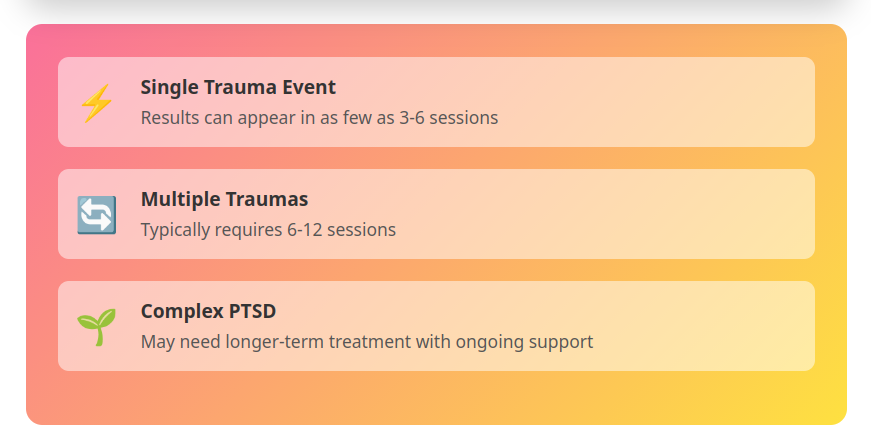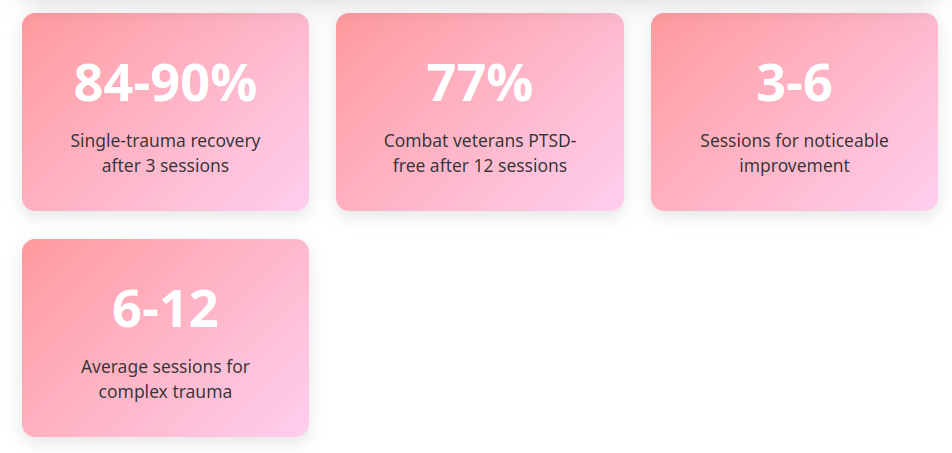What is EMDR Therapy: A Comprehensive Guide to Eye Movement Desensitization and Reprocessing
If you've been struggling with trauma, anxiety, or distressing memories that won't seem to fade, you may have heard about EMDR therapy. At Apollo's Center for Healing & Growth in Cypress, Texas, we've witnessed the transformative power of this evidence-based treatment. But what exactly is EMDR, and could it be right for you?
Understanding EMDR Therapy
Eye Movement Desensitization and Reprocessing (EMDR) is a structured psychotherapy approach designed to help people heal from trauma and other distressing life experiences. Developed by psychologist Dr. Francine Shapiro in 1987, EMDR has evolved into one of the most researched and effective treatments for post-traumatic stress disorder (PTSD) and various other mental health conditions.
Unlike traditional talk therapy, EMDR doesn't require you to discuss your traumatic experiences in extensive detail. Instead, it works by helping your brain process and integrate disturbing memories in a way that reduces their emotional impact.
How Does EMDR Work?
EMDR therapy is based on the Adaptive Information Processing (AIP) model, which suggests that trauma and distressing experiences can overwhelm the brain's natural healing process. When this happens, memories become "stuck" and continue to cause emotional distress.
During EMDR sessions, your therapist will guide you through bilateral stimulation—typically side-to-side eye movements, though tapping or auditory tones can also be used. While focusing on a traumatic memory, these bilateral movements help your brain reprocess the experience, allowing it to be stored in a less distressing way.
The therapy follows an eight-phase protocol:
- History and Treatment Planning: Your therapist assesses your background and identifies target memories
- Preparation: You'll learn coping strategies and establish a foundation of trust
- Assessment: Specific memories are identified along with associated beliefs and sensations
- Desensitization: Bilateral stimulation is applied while you focus on the target memory
- Installation: Positive beliefs are strengthened and reinforced
- Body Scan: Physical sensations are checked to ensure complete processing
- Closure: Each session ends with stabilization techniques
- Reevaluation: Progress is reviewed at the beginning of each subsequent session
How Long Does EMDR Take to Work?
One of the most common questions we hear at our Cypress practice is about the timeline for results. The answer varies depending on several factors, including the complexity of your trauma, the number of traumatic events you've experienced, and your individual processing speed.
Some clients notice improvements after just a few sessions, particularly when addressing a single traumatic event. For complex trauma or multiple distressing experiences, treatment typically ranges from 6 to 12 sessions, though some individuals may benefit from longer-term therapy. Many clients report feeling noticeably better within 3 to 6 sessions.

What Conditions Can EMDR Treat?
While EMDR was initially developed for PTSD, research has shown its effectiveness for a wide range of mental health concerns.
EMDR for PTSD
EMDR has demonstrated exceptional results in treating PTSD, with treatment goals for PTSD including reducing intrusive memories, decreasing hypervigilance, and helping clients regain a sense of safety. Multiple studies have shown that EMDR can be as effective as cognitive behavioral therapy for trauma, often working more quickly.
EMDR for Depression
EMDR depression treatment addresses the underlying traumatic experiences that often contribute to depressive symptoms. By processing these root causes, many clients experience significant relief from persistent sadness, hopelessness, and low motivation.
EMDR for OCD
Recent research supports using EMDR for OCD, particularly when obsessive-compulsive symptoms are connected to traumatic experiences. The therapy can help reduce the intensity of intrusive thoughts and compulsive behaviors by addressing the underlying trauma.
EMDR for Grief
Processing loss through EMDR for grief can help individuals move through complicated bereavement. The therapy doesn't eliminate the natural sadness of loss but can reduce the traumatic aspects of grief, such as intrusive images or overwhelming emotional reactions.
EMDR for Adolescents
EMDR adolescent therapy has shown promising results for young people dealing with trauma, anxiety, and behavioral issues. The approach can be adapted to be age-appropriate while maintaining its effectiveness.
EMDR Success Rate: What Does the Research Say?
The EMDR success rate is impressive, with numerous studies supporting its effectiveness. Research indicates that 84-90% of single-trauma victims no longer have PTSD after just three 90-minute sessions. For combat veterans, 77% were PTSD-free after 12 sessions.
The World Health Organization, American Psychiatric Association, and Department of Veterans Affairs all recognize EMDR as an effective treatment for trauma. Its strong evidence base has made it a first-line treatment recommendation for PTSD.

Can EMDR Be Done Virtually?
Yes, can EMDR be done virtually is a question with a positive answer. Virtual EMDR has become increasingly common and research suggests it can be as effective as in-person sessions. Using video conferencing platforms, therapists can guide clients through bilateral stimulation using on-screen movements, audio cues, or self-administered tapping.
At Apollo's Center for Healing & Growth, we offer both in-person and virtual EMDR options to accommodate your preferences and needs.
The EMDR Experience: What to Expect
Using EMDR Worksheets
Throughout your treatment, your therapist may provide EMDR worksheets to help you track your progress, identify target memories, and practice coping techniques between sessions. These tools enhance the therapeutic process and support your healing journey.
Does EMDR Make You Tired?
It's common to wonder, does EMDR make you tired? Many clients do experience fatigue after sessions, which is completely normal. EMDR is intense brain work—you're processing difficult memories and emotions in a concentrated way. This mental and emotional effort can leave you feeling exhausted, similar to how you might feel after intense physical exercise.
We recommend scheduling EMDR sessions at times when you can rest afterward and practicing good self-care following each appointment.
Insurance and Accessibility
EMDR Therapy Medicaid Coverage
For those wondering about EMDR therapy Medicaid coverage, the good news is that many Medicaid plans do cover EMDR when provided by a licensed mental health professional. Coverage varies by state and individual plan, so we recommend contacting your insurance provider to verify your specific benefits.
Is EMDR Right for You?
EMDR may be beneficial if you're experiencing:
- Traumatic memories that intrude on daily life
- Anxiety or panic attacks
- Persistent depression
- Grief that feels overwhelming
- Phobias or fears
- Performance anxiety
- Self-esteem issues rooted in past experiences
- Disturbing life events that continue to affect you
EMDR is generally safe and well-tolerated, though it's not recommended for individuals currently experiencing severe dissociation, active substance abuse, or certain unstable medical conditions. Your therapist will conduct a thorough assessment to determine if EMDR is appropriate for your situation.
Taking the Next Step with Apollo's Center for Healing & Growth
At Apollo's Center for Healing & Growth in Cypress, Texas, our experienced therapists are trained in EMDR therapy and committed to creating a safe, supportive environment for your healing journey. We understand that reaching out for help takes courage, and we're here to support you every step of the way.
Whether you're dealing with trauma, anxiety, depression, or other challenges, EMDR therapy offers a path toward healing that doesn't require you to relive your experiences in painful detail. Instead, it provides a structured, evidence-based approach to help your brain process and integrate difficult memories, allowing you to move forward with greater peace and resilience.
Ready to learn more about how EMDR can help you? Visit our EMDR services page or contact Apollo's Center for Healing & Growth today to schedule a consultation. Your journey toward healing starts with a single step, and we're here to walk alongside you.










